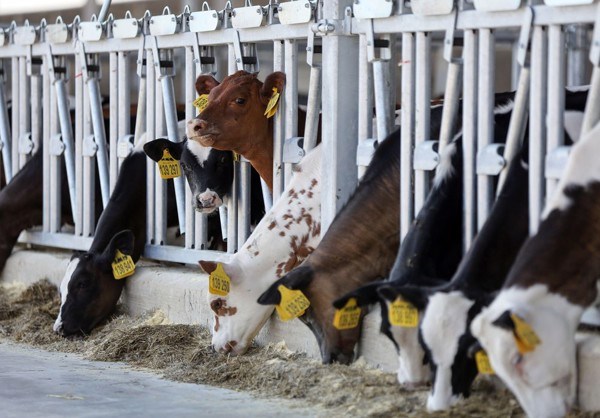Today, on the World Day for Farmed Animals, the European Commission will receive the first successful European Citizens’ Initiative on farm animal welfare, calling for an end to the use of cruel cages.
Every year hundreds of millions of farmed animals across the European Union are forced to spend miserable lives imprisoned in tiny cages, denying them the space to move freely and causing them enormous suffering.
These cages are not only cruel – they are also unnecessary as more humane alternatives are already in use.
That is why 1.4 million people from across Europe have signed a European Citizens’ Initiative (ECI) calling on the EU to ban the use of cages for farmed animals.
The ‘End the Cage Age’ Initiative, with support from over 170 NGOs and umbrella organisations, is being handed in to the European Commission today. The Commission will then have six months to decide on its response.
To be valid, an ECI has to collect at least 1 million signatures in total as well as a minimum number of signatures in at least seven EU countries.
Many initiatives fail to meet these conditions. ‘End the Cage Age’ is only the sixth ECI to be successful, out of 75 Initiatives registered since the first Initiative was launched over eight years ago.
It is also equal first for the number of countries where total signatures collected exceed the minimum thresholds, another clear sign that animal welfare is a common concern shared by people in all countries across the EU.
A ‘Eurobarometer’ survey of EU public opinion conducted for the Commission found that 94% of people believe protecting the welfare of farmed animals is important and 82% want farmed animals better protected.
Many consumers are aware of the plight of egg-laying hens kept in barren battery cages. Those cages were banned by the EU – only to be replaced by the equally cruel ‘enriched’ cages that allow each hen the space about the size of an A4 sheet of paper.
Perhaps even less well known is that millions of rabbits, sows (female adult pigs), quail, ducks and geese also spend all or part of their lives confined in inhumane systems that prevent them from carrying out many of their natural behaviours.
In addition, millions of calves raised for veal are taken away from their mothers within hours of birth to be confined, alone in individual pens, for the first two months of their short lives.
Altogether, more than 300 million farmed animals across the EU suffer in cages or individual stalls every year. And this is a conservative estimate!
As well as being cruel, these industrial ‘factory farms’ have a host of other negative impacts on animals and people alike.
There is a wealth of evidence, for instance, that the stressful, crowded conditions on factory farms help drive the emergence and spread of infectious diseases that are dangerous to us humans, as well as to animals.
The Covid-19 crisis has been a devastating reminder that how we treat wild and farmed animals is critical not only to their wellbeing but also to human health. In July, the Council of the EU pointed to industrial agriculture as one of the factors that increase the risk of future pandemics and “need to be tackled”.
The good news is that we can End the Cage Age because viable alternatives to cages and individual pens exist. And some enlightened EU member states are leading the way.
Specifically, all cages for egg-laying hens are banned or being phased out in Austria, Germany, Luxembourg and Slovakia. Czechia is now on the finishing line of adopting such a ban. Greece is the latest country to jump on the bandwagon supporting an EU-level ban.
Belgium has responded to public concern over conventional barren cages for rabbits by moving to alternative ‘park’ systems which give the animals more space. Sweden has banned all cages for sows, while Germany recently voted to phase out the sow cages traditionally used in early pregnancy.
So, it can be done. What is the EU waiting for?
The Commission has six months to respond to the huge public support for the ECI. The public will not be satisfied by just fine words. Words will need to be turned into actions, and in this case, this means new legislation. It is high time to End the Cage Age.
Dr. Olga Kikou, member of the Citizens’ Committee of the ‘End the Cage Age’ European Citizens’ Initiative


